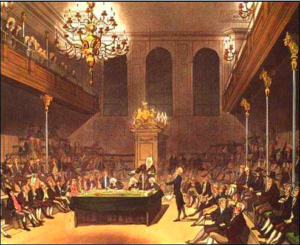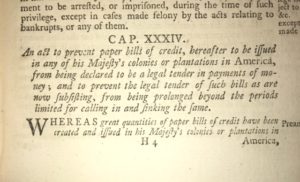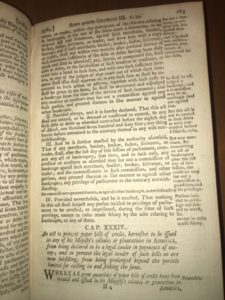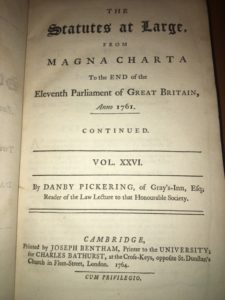CURRENCY ACT OF 1764, Chapter XXXIV, Volume XXVI of Danby Pickering’s Statutes at Large, printed by Joseph Benthem in 1764.
[4 GEO. III c. 344]
Adopted the same year as the Sugar Act, the Currency Act prohibited the colonies from  printing paper money. It also required that existing paper money be gradually retired from circulation. The colonists had difficulty accumulating hard cash (precious metal coins) because they imported more than they exported.
printing paper money. It also required that existing paper money be gradually retired from circulation. The colonists had difficulty accumulating hard cash (precious metal coins) because they imported more than they exported.
The Currency and Sugar Acts also came at a bad time for the colonies, which were suffering through a depression following the French & Indian War. The prospect of higher custom duties, inadequate supplies of paper currency, and the loss of civil liberties would generate a powerful backlash.
Despite petitions from eight separate colonial legislatures, Prime Minister George Grenville decided to adopt the Stamp Act in 1765.
Taken together, the Currency Act, Sugar Act, and Stamp Act were an effort by Grenville to begin paying of the debt that Britain had accumulated during the French and Indian War (otherwise known as the Seven Years War). Grenville reasoned that the colonists should bear the cost of providing for their protection and stationing 10,000 British troops in the colonies.
Set forth below are whereas clauses from the Currency Act explaining Parliament’s intent:
|
WHEREAS great quantities of paper bills of credit have been created and issued in his Majesty’s colonies or plantations in America, by virtue of acts, orders, resolutions, or votes of assembly, making and declaring such bills of credit to be legal tender in payment of money: and whereas such bills of credit have greatly depreciated in their value, by means whereof debts have been discharged with a much less value than was contracted for, to the great discouragement and prejudice of the trade and commerce of his Majesty’s subjects, by occasioning confusion in dealings, and lessening credit in the said colonies or plantations: for remedy whereof, may it please your most excellent Majesty, that it may be enacted; and be it enacted by the King’s most excellent majesty, by and with the advice and consent of the lords spiritual and temporal, and commons, in this present parliament assembled, and by the authority of the same, That from and after the first day of September, one thousand seven hundred and sixty four, no act, order, resolution, or vote of assembly, in any of his Majesty’s colonies or plantations in America, shall be made, for creating or issuing any paper bills, or bills of credit of any kind or denomination whatsoever, declaring such paper bills, or bills of credit, to be legal tender in payment of any bargains, contracts, debts, dues, or demands whatsoever; and every clause or provision which shall hereafter be inserted in any act, order, resolution, or vote of assembly, contrary to this act, shall be null and void. II. And whereas the great quantities of paper bills, or bills of credit, which are now actually in circulation and currency in several colonies or plantations in America, emitted in pursuance of acts of assembly declaring such bills a legal tender, make it highly expedient that the conditions and terms, upon which such bills have been emitted, should not be varied or prolonged, so as to continue the legal tender thereof beyond the terms respectively fixed by such acts for calling in and discharging such bills; be it therefore enacted by the authority aforesaid, That every act, order, resolution, or vote of assembly, in any of the said colonies or plantations, which shall be made to prolong the legal tender of any paper bills, or bills of credit, which are now subsisting and current in any of the said colonies or plantations in America, beyond the times fixed for the calling in, sinking, and discharging of such paper bills, or bills of credit, shall be null and void. III. And be it further enacted by the authority aforesaid, That if any governor or commander in chief for the time being, in all or any of the said colonies or plantations, shall, from and after the said first day of September, one thousand seven hundred and sixty four, give his assent to any act or order of assembly contrary to the true intent and meaning of this act, every such governor or commander in chief shall, for every such offence, forfeit and pay the sum of one thousand pounds, and shall be immediately dismissed from his government, and for ever after rendered incapable of any public office or place of trust. IV. Provided always, That nothing in this act shall extend to alter or repeal an act passed in the twenty fourth year of the reign of his late majesty King George the Second, intituled, An act to regulate and restrain paper bills of credit in his Majesty’s colonies or plantations of Rhode Island and Providence plantations, Connecticut, the Massachuset’s Bay, and New Hampshire, in America, and to prevent the same being legal tenders in payments of money. V. Provided also, That nothing herein contained shall extend, or be construed to extend, to make any of the bills now subsisting in any of the said colonies a legal tender. |



